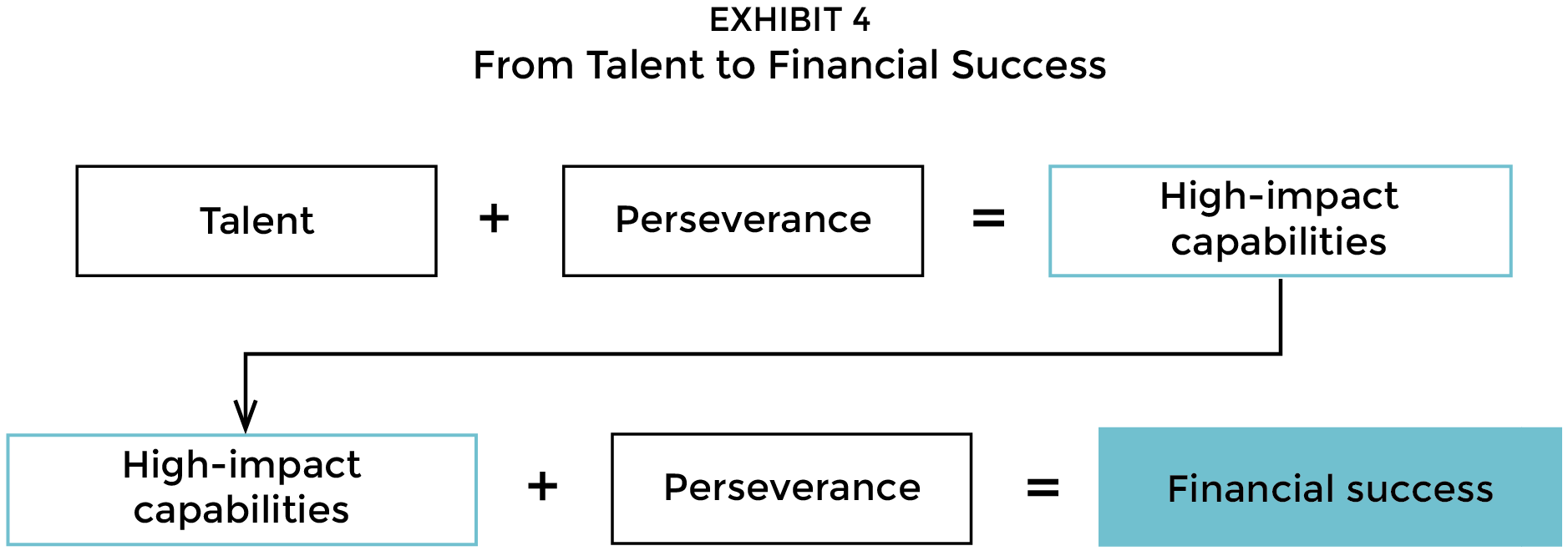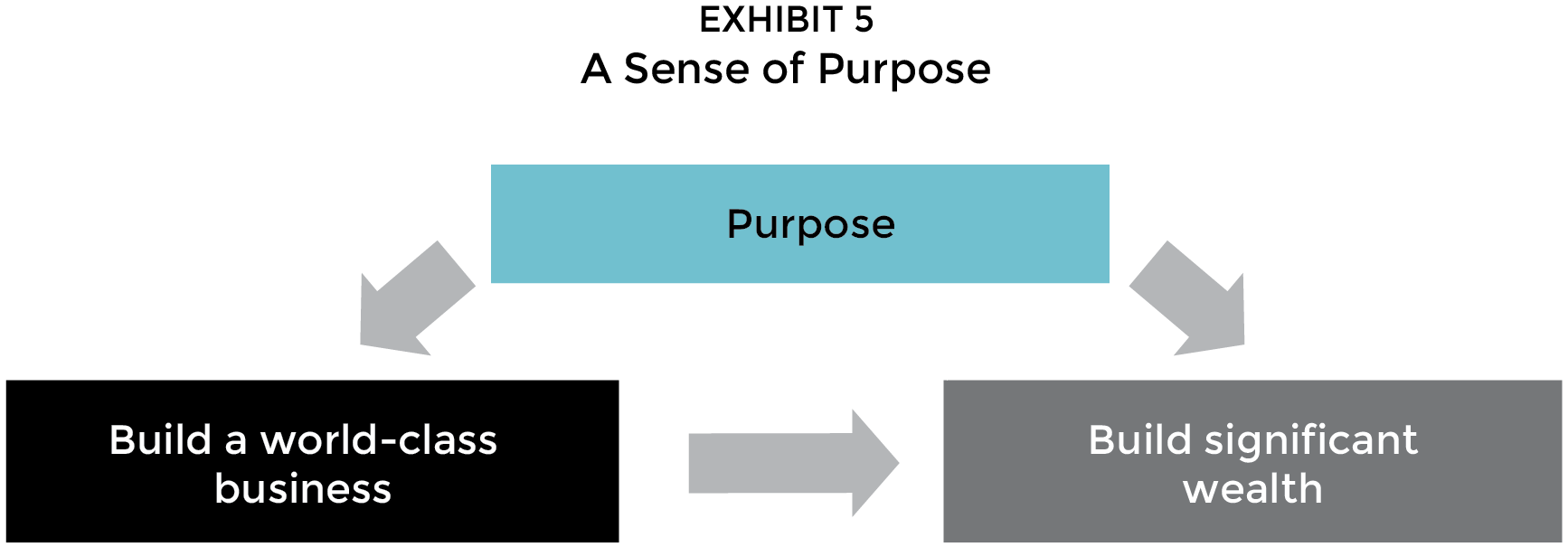Key Takeaways
- Failure is not an option—it’s a given. Therefore, perseverance is essential to building wealth.
- Perseverance stems largely from having self-efficacy—the ability to say “I can” in specific situations, and believe it.
- Perseverance can be learned and strengthened over time through resources like mastermind groups, red teaming exercises, and working with consultants and peers.

One of the most important qualities we see among the Super Rich (those with a net worth of $500 million or more) is perseverance. The ability to keep going and stick to it—especially when times are tough—is a cornerstone to many of the greatest accomplishments achieved by these highly successful individuals.
Of course, there’s a lot that goes into building considerable personal wealth. For example, you’ve got to be in the line of money by pursuing endeavors that have the strongest possibility of enabling you to create that wealth. That could mean owning a business versus working for someone else, while also choosing projects and initiatives that give you the best shot at building great wealth.
Obviously, talent is another major part of the success equation. Your innate abilities can make a big difference. However, talent is—in numerous ways—only a starting point. Talent does not necessarily translate into achievement.
And let’s not kid ourselves: Luck also plays a prominent role in becoming wealthy. Those who think they did it all through only their hard work and brains and that luck played no part are almost certainly not sizing up the situation clearly.
But ultimately, perseverance must be mixed in with these other factors to make the “secret sauce” of success. When you combine perseverance and raw talent, for example, you can develop high-impact capabilities—indeed, you can’t have such capabilities without perseverance. Then, by applying those capabilities with perseverance in moneymaking ventures, you can potentially set the stage for tremendous financial success (see Exhibit 4).

Why perseverance?
Why is perseverance so essential to substantial financial success? Simple: Along the path to success, you will fail at various steps. You will encounter land mines and occasionally step on them—from economic and political crises entirely beyond your control to poor business decisions that come straight from you. In short, failure is not an option—it’s a given!
The difference between the self-made Super Rich and others is that the Super Rich expect adversity, deal with it head-on and stay focused on their vision of their ideal future. They realize their talents are the starting point and that their high-impact capabilities (and subsequent success) depend on their commitment—their perseverance.
Several studies have attempted to measure the impact and importance of perseverance on the outcomes we achieve—as entrepreneurs, as students and in life generally. One of the most well-known studies examined professionals in investment banking, painting, journalism, academia, medicine and law. It concluded that “One personal quality is shared by the most prominent leaders in every field: grit … perseverance and passion for long-term goals.” Indeed, grit was a better predictor of success than was IQ or conscientiousness.
A later study of more than 11,000 cadets at the U.S. Military Academy at West Point examined how cognitive ability, physical ability and grit impacted the cadets’ success. While cognitive ability was a strong predictor of academic results, grit was actually more influential than cognitive or physical ability when it came to making it through a six-week training course described in the academy’s handbook as “the most physically and emotionally demanding part of the four years at West Point.” Cadets whose level of grit was a standard deviation higher than that of their peers had 54 percent greater odds of making it through this initiation. Also, grit and physical ability were each better predictors of whether a cadet would graduate in four years than was cognitive ability.
Goals and purpose
So if perseverance is so vital, how do you set yourself up to have enough of it in the face of challenges and outright failures?
One of the foundations of perseverance is meaningful goals—establishing hard-to-reach business and financial goals as well as a path to attain them. In all instances we’re aware of, the self-made Super Rich have such goals and are passionate about reaching them. Those goals provide a strong sense of purpose—and, consequently, motivate the Super Rich and those seeking to become Super Rich to persevere.
Note: For most self-made Super Rich, their purpose goes beyond merely becoming extremely wealthy. It also includes building a world-class business (see Exhibit 5).

Another foundation is innate characteristics. For most of the self-made Super Rich, being tenacious is a part of their character that will not go away. As they get closer to reaching their significant financial goals, the Super Rich tend to want even more. It might be a little more or a lot more, but they tend to “move the goal line” further out every time they close in on it.
Think of it as catching sight of the top of a mountain you’re climbing. As you get closer to the peak, you find it is really a plateau—and when you look up, you see a new top. It is to that true top you now want to go. Many of the self-made Super Rich tend to achieve their net worth goals only to find they have reached a plateau and not the pinnacle. What do they do? They reset their financial goals higher.
Many who have built significant enterprises and reaped considerable economic rewards for doing so believe they are not quite good enough and what they have achieved is not quite good enough. They are chasing a dream that is unlikely to materialize. In effect, they are satisfied with being unsatisfied as they strive to improve and do more.
The importance of self-efficacy
Perseverance also stems largely from having greater self-efficacy—a defining characteristic of the majority of self-made millionaires and billionaires.
Self-efficacy is a person’s belief that he or she can be very successful in specific situations. Self-efficacy impacts every entrepreneur’s business activities, from the effort exerted to the level of commitment to finish when confronted with obstacles to the goals people set for themselves. Simply put: It’s the “I can” or “I cannot” belief.
High self-efficacy = “I can.”
Important: The self-made Super Rich recognize that they are good at certain tasks and functions but not at all of them. This leads them to concentrate their efforts in those activities at which they are especially proficient—doing only what they do really well—and then delegate as much as possible the tasks they don’t have the expertise to tackle extremely well. Put another way: They focus on strengths, not on shoring up weaknesses.
The self-made Super Rich generally understand that difficult, high-reward situations frequently present challenges that can prove personally draining and discouraging—sometimes even genuinely depressing. Those with high self-efficacy are good at persevering because they know and believe deeply that there is an excellent chance they will end up successful if they don’t give up.
High self-efficacy also results in a deeper, more intense interest in these difficult high-reward situations. The self-made Super Rich will often immerse themselves in critical aspects of these situations—thus enabling them to develop truly insightful understanding that often results in creative solutions to obstacles.
Another benefit of high self-efficacy is being able to bounce back from hindrances and serious setbacks relatively quickly. The self-made Super Rich realize their strengths and weaknesses. For example, they understand that a business deal can and may be lost—but they don’t let it slow them down. They justifiably maintain their conviction in their own capabilities and move on to the next opportunity.
Commit to persevere
While there is no single factor that by itself will empower you to generate significant personal wealth, you’re likely not going to get there without plenty of perseverance. The good news: Perseverance can be learned and strengthened over time. Mastermind groups, red teaming within your organization (to test your assumptions and approaches) and other methods can help you foster and grow perseverance. And consultants, coaches and trusted colleagues can further reinforce your ability to say “I can” when the moment looks bleak.


0 Comments